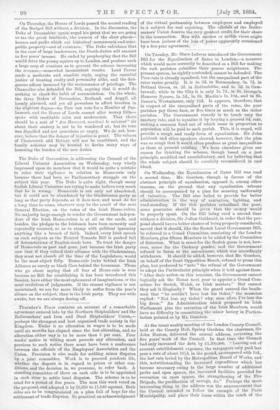On Tuesday, Mr. Shaw-Lefevre introduced the Government Bill for the
Equalisation of Rates in London,—a measure which would more correctly be described as a Bill for making the rich parishes subsidise their poorer neighbours. The• present system, he rightly contended, cannot be defended. The• Poor-rate is already equalised, but the unequalised part of the- rates varies greatly. It is 4s. 3d. in Bermondsey, 3s. 7d. in Bethnal Green, 4s. 2d. in Rotberhithe, and 4s. 3d. in Cam- berwell; while in the City it is only ls. 7d., in St. George's, Hanover Square, la. 5d., in St. Martin's ls. 10d., and in St. James's, Westminster, only 10d. It appears, therefore, that in respect of the unequalised parts of the rates, the poor parishes pay three, four, or five times as much as the richer parishes. The Government remedy is to touch only the sanitary rate, and to equalise it by levying a general 6d. rate, making a common fund out of which sums in proportion to- population will be paid to each parish. This, it is urged, will provide a rough and ready form of equalisation. Sir John. Lubbock and other speakers showed, however, that the plan was so rough that it would often produce as great inequalities as those at present existing. We have elsewhere given our reason for thinking the scheme, though based on a just principle, muddled and unsatisfactory, and for believing that- the whole subject should be carefully reconsidered in cool blood.


































 Previous page
Previous page